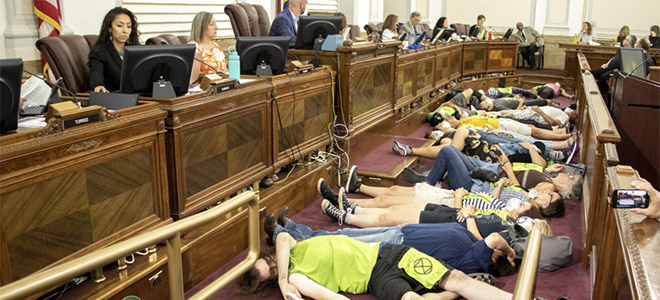
by Sam Brasch
CPR News
Photo: Climate change activists perform a “die-in” during Denver City Council. Aug. 5, 2019. Credit: Kevin J. Beaty/Denverite.
Last April, Dave Robinson walked out to the middle of Denver’s busy Speer Boulevard and sat down.
Six other Extinction Rebellion activists joined the Littleton software engineer. Some flew colorful flags with the movement’s circled hourglass logo which symbolizes time running out for the planet and its species. As traffic backed up, other members of the group walked the line of cars to hand out paper mache flowers and to apologize for the inconvenience.
It didn’t take long for police to lift Robinson and his colleagues off the roadway.
“The climate emergency is affecting everyone,” he said. “So yes, we’re inconveniencing people, but these are people we want to reach out to. They are impacted as well.”
Extinction Rebellion — abbreviated XR — first won major headlines last November when thousands occupied bridges across London. A few months later, it parked a pink boat in the middle of one of the city’s busiest intersections. By occupying a number of other high-traffic sites, it managed to bring the British capital to a standstill for over a week.
The movement’s theatrical demonstrations have since crossed the Atlantic.
Demonstrators with the movement glued themselves to the doors of the U.S. Capitol in July. In Colorado, XR brought a new level of confrontational tactics to the state’s long-simmering fight over oil and gas development and climate change. Besides blocking traffic, it has staged “die-ins” at Denver City Council meetings and coughed over testimony before the state’s top oil and gas regulators.
By seizing public attention, the group hopes to force governments to “tell the truth” about climate change. The call is listed first among the movement’s demands. In practice, it means pushing local governments to declare climate change an emergency.
The strategy has seen some success in Colorado. Members of the group say they helped push the City of Boulder and Boulder County to make those kinds of declarations. Fort Collins and Basalt have made similar proclamations.
Beyond a shift in language around climate change, XR activists want net-zero emission by 2025, a far more ambitious goal than even UN scientists called for in the last IPCC report. They also demand citizens assemblies to oversee the transition away from fossil fuels.
Lynn Granger, executive director of the Colorado Petroleum Council, said such calls-to-action aren’t much help as her industry and the state hash out new rules for oil and gas extraction.
“We are all in favor of peaceful protest, but what we really want is to make sure we are achieving is reasonable regulation and having reasonable discussions,” she said.
But Max Boykoff, an associate professor of environmental studies at the University of Colorado Boulder, said it’s OK if all of XR demands aren’t “reasonable.” His recent book “Creative (Climate) Communications” discusses the “radical flank theory,” which suggests more radical social movements can help advance more moderate positions.
“When certain groups are more aggressive, it opens up a space within which other groups can move in and shape those conversations,” he said.
Boykoff added that XR appears to push the boundaries of the conversation while stopping short of alarmism. While the group’s rhetoric is scary, he said it still offers concrete responses for individuals and communities.
XR activists also say social science informs their strategies. Many point to the work of Harvard political scientist Erica Chenoweth, who found non-violent movements haven proven much more likely to achieve their goals than violent ones. Her work also notes every successful campaign attracted more than 3.5 percent of a population.
That number has become a crucial threshold for XR. But at least in Colorado, they are nowhere near it.
Robinson guesses there are about 20 hardcore organizers in the Denver and Boulder XR chapters. In a pinch, he estimates they can get about 60 people onto the streets.
The next few days will be a test of XR’s support in the U.S. This Friday, students plan to kick off a week of climate actions with strikes in major cities. On the following Monday, XR hopes to join other groups in an attempt to shut down Washington D.C.
Robinson said events in Denver are planned for the same day, but was cagey about specifics. Online postings offer some strong hints, though. The group plans a pair of events at a park off of Speer Boulevard. One is labeled Morning Rush Hour; the other Afternoon Rush Hour.
Lisa Widdekind plans to take part. The Boulder emergency management coordinator said she tried more traditional methods of climate activism, like working for nonprofits and supporting anti-hydraulic fracturing ballot initiatives. She decided to join XR after growing frustrated with a lack of movement on climate change.
“The best thing you can do for climate depression and anxiety is to take action,” she said.
Her depression spiked following a conversation with her 22-year-old daughter, Julia DeBelle. Recently, while the two talked in their Boulder apartment, DeBelle told her mom she might not have children because of climate change.
“I just started sobbing about it,” DeBelle said. “Out of anger and frustration and mourning the loss of everything we don’t get to experience.”
Widdekind called the moment “devastating.” When asked if her activism helped, she fought back tears to offer an answer.
“It’s the only thing I know how to do,” she said.

